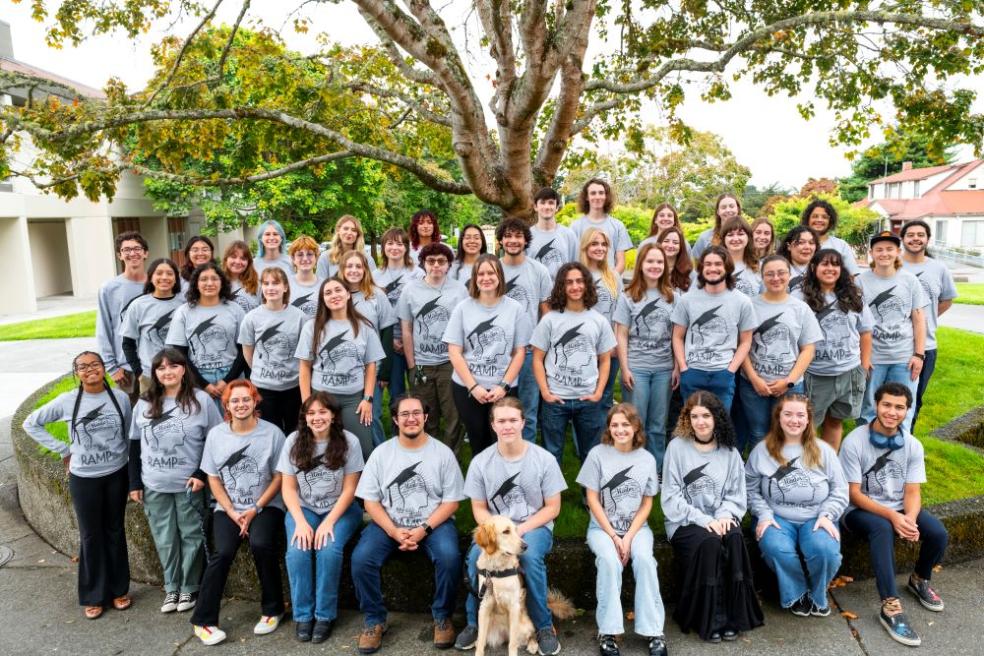
“The 2024-25 academic year is the first time RAMP was able to pre-assign a mentor to all new incoming students,” says glo Brown, RAMP coordinator. “This means every student, regardless of class standing, has immediate access to peer support.”
RAMP was established in 2012 and was initially designed to assist first-year, first-generation students by pairing them with peer mentors who provide guidance, academic support, and a sense of community. The program has now grown to offer peer mentoring to all incoming students, like lower-division transfer students—those who enter with college credits earned in high school or through Advanced Placement exams, matching them with upperclassmen mentors who deliver academic advising, clarify University policies, and direct students to campus and community resources. Over recent years, the program has established itself as an essential resource for incoming students, aiding their successful transition into college life.
Research shows that peer mentoring has a positive impact on college students, increasing retention, a sense of belonging, and more.
According to a study by the Journal of College Student Retention: Research, Theory & Practice, students with peer mentors feel significantly more connected to the university, perceive significantly more support at the university, and feel significantly more like an active part of the university than students without a mentor.
One of the key takeaways from RAMP’s success is the powerful influence of peer mentors.
"I tell the mentors all the time that they are having a way more powerful impact on students than I ever could. As a supervisor, I have a role, but I’m not their peer. I don’t have their lived experience," Brown says.
This peer-to-peer dynamic is especially important in today’s higher education landscape.
"Ten years ago, mentorship looked very different. The challenges students face now—including the aftermath of a global pandemic—require a new approach," Brown says. "We can’t mentor students the way we did back then. We have to find what works for this generation and students with the same lived experience."
RAMP’s expansion has been particularly impactful for transfer students, who often arrive with prior college experience but still face challenges in transitioning to a new university.
“Transfer students tend to be more proactive in seeking support,” Brown says. “They walk in and ask, ‘Is this where I get a mentor? Can I have one?’ They know they need guidance and take full advantage of the resources available.”
In fall 2024, RAMP assigned mentors to approximately 900 first-time students and transfer students. College-based mentors currently support over 500 students, with numbers continuing to grow each semester.
Mentors typically work up to 10 hours a week, balancing their academic schedules while assisting mentees. They facilitate one-on-one meetings, guide students to campus resources, and help ease the transition to university life. The program also benefits mentors, who gain leadership experience that prepares them for future careers in education, advising, and student services.
“Many of our former mentors have gone on to leadership roles across campus, in cultural centers, and as peer advisors. RAMP provides a strong foundation for both mentors and mentees to thrive,” Brown says.
With a philosophy of “no wrong door,” RAMP ensures that students always have someone to turn to for support. This expansion is expected to further strengthen student retention and success at Cal Poly Humboldt.
Students interested in becoming mentors are encouraged to apply and take advantage of the opportunity to make a difference in their peers' lives. The program also provides mentors with communication skills and a deeper connection to the university community.
As RAMP looks to the future, its goal remains clear: to continue fostering student success through peer support.
"This program is growing, and that’s what we want to see. We want it to multiply and reach as many students as possible," Brown says.
For more information on how to become a mentor or get involved in the program, visit https://www.humboldt.edu/ramp or contact the program office directly at ramp@humboldt.edu or visit the office in Library 25.